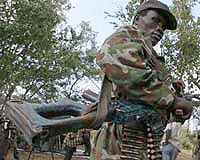| . |  |
. |
Abuja, Nigeria (UPI) May 6, 2010 The death of Nigerian President Umaru Yar'Adua has plunged Africa's most populous country into crisis as it grapples with simmering unrest in its oil fields, Christian-Muslim bloodletting, rampant corruption and power struggles in the ruling party. With a national and presidential elections scheduled for next April, the political in-fighting is expected to intensify in a country that was plagued by military coups until the transition from military rule to democracy in 1999 and could yet revert if serious trouble erupts. The expected upheaval could have far-reaching consequences, not just for Nigeria but for West Africa as a whole and for the United States, a major importer of Nigerian oil. "The United States wants stability in Nigeria so that there's stability in the oil sector," said U.S. analyst Mark Schroeder. Yar'Adua's deputy, Vice President Goodluck Jonathan, was sworn in as president Thursday. He had been acting president since Feb. 9, after the National Assembly approved the transfer of power during a prolonged absence by Yar'Adua. On Nov. 23, Yar'Adua was flown to Saudi Arabia for treatment for a heart condition that eventually killed him. He was secretly flown back to Nigeria Feb. 23 amid a mushrooming political crisis but was kept in seclusion until he died. His five-month absence caused a constitutional crisis and sharpened the political differences between the predominantly Muslim north and the overwhelmingly Christian south. Yar'Adua was a northerner, Jonathan hails from the Niger Delta, the oil- producing center in the south. Nigeria's political core is an unwritten agreement between the two elites within the People's Democratic Party, the only party to have ruled the country since the transition to democracy in 1999, that they alternate the presidency between them every eight years -- that is, two four-year presidential terms. This agreement, which lies outside the constitution, is commonly known as the "zoning" accord. Since Yar'Adua was only in the third year of his first term, his death thus causes a major political problem that could affect the overall stability of the country. The northern political barons will no doubt insist that a northerner be appointed as president for the rest of their tenure which ends in 2015. But Jonathan, the southerner, could well demand he stay in the post, a move that could carry immense personal risk. He has given no indication what he plans to do. But he has been extremely active since February, dispensing largess from Nigeria's Excess Crude Account, to state and local governments -- and thus buying support -- as well as replacing Yar'Adua's Cabinet with one of his own and signing a record-breaking budget for fiscal 2010-11. He has vowed to stamp out rampant official corruption, which has severely hampered Nigeria's development. If he is genuine, that will mean turning Nigerian politics inside out and making a lot of enemies. "The north believes that it is entitled to another term and will not back down easily," the U.S. global security consultancy Stratfor reported. "The south may see an opportunity to entrench Jonathan in his position but to challenge the north would be fight they must calculate as being worth the risk." The northerners, "to cut short Jonathan's chances by reining in the amount of time he has to serve as president are likely to call for national elections to be moved up," Stratfor observed. Negotiations are already under way to advance them to January. But the northerners "will likely press to have those elections moved up sooner so as to cut short Jonathan's tenure -- and more critically, the time he has to buy favor, supporters, and demonstrate his style of governance," Stratfor concluded. The impact of all this political scrapping on Nigeria's other serious problems, the insurgency in the south that has hit Africa's largest oil industry hard, slashing production by one-third to around 2 million barrels a day and the constant tit-for-tat massacres by Christians and Muslims in the north-interface isn't clear. In the immediate aftermath of Yar-Adua's death, the country has been calm as it began a week of national mourning. But the political crisis is likely to worsen the country's problems if it drags on. And there remains the risk the army, one of the largest in Africa, could intervene as it has so many times before.
Share This Article With Planet Earth
Related Links Africa News - Resources, Health, Food
 'Twenty-six killed' in south Sudan tribal fighting
'Twenty-six killed' in south Sudan tribal fightingKhartoum (AFP) May 5, 2010 Clashes over livestock between members of two large tribes killed 26 people in the south Sudan state of Warrap on Wednesday, a senior officer in the south Sudan armed forces said. "Nuer coming from Mayom county (in the southern state of Unity) attacked Dinka in (neighbouring) Warrap state. Eleven Nuer were killed and 15 Dinka," said Malaak Auyen Ajok, spokesman for the former rebel Sudan Peo ... read more |
|
| The content herein, unless otherwise known to be public domain, are Copyright 1995-2010 - SpaceDaily. AFP and UPI Wire Stories are copyright Agence France-Presse and United Press International. ESA Portal Reports are copyright European Space Agency. All NASA sourced material is public domain. Additional copyrights may apply in whole or part to other bona fide parties. Advertising does not imply endorsement,agreement or approval of any opinions, statements or information provided by SpaceDaily on any Web page published or hosted by SpaceDaily. Privacy Statement |